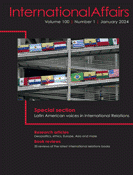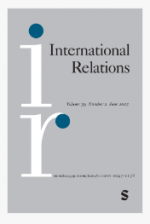Digital Diplomacy against International Stigmatization: The Bukele Case

The article addresses the diversity of digital diplomatic strategies used by governmental actors to fight international stigmatization. Faced with structural limitations, the leaders of small states use it to defend their political project's image or reputation when they come under international criticism for deviating from or transgressing international norms. Borrowing from Erving Goffman, I draw on the idea that social networks can be conceptualized as orders of interaction, in which digital diplomatic strategies can be put in place and international politicization and normative debates can develop. An examination of Salvadoran president Nayib Bukele's Twitter posts from January 2019 to May 2022, during a period of increasing international criticism regarding the authoritarian–populist drift in El Salvador, improves our knowledge of the diversity of digital diplomatic strategies. Consequently, this enlightens us on the constitutive elements of how small states manage their relationship with external actors, their image and status, and eventually how they challenge the international order, international norms and powers.




